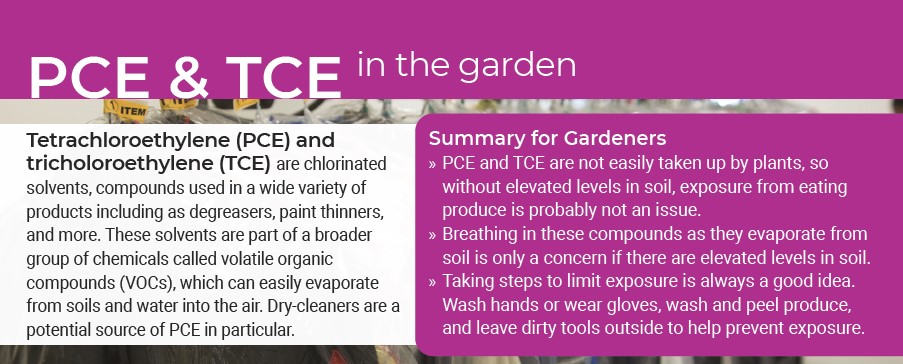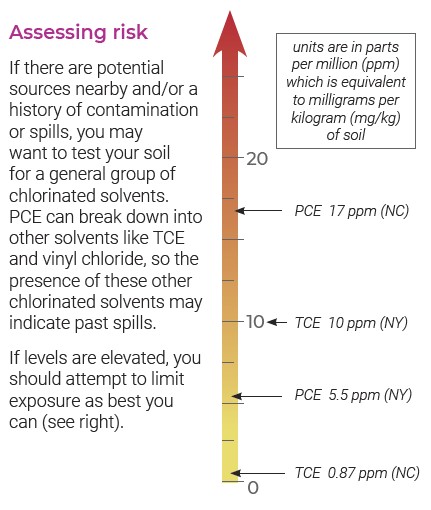PCE & TCE in the Garden
go.ncsu.edu/readext?831522
en Español / em Português
El inglés es el idioma de control de esta página. En la medida en que haya algún conflicto entre la traducción al inglés y la traducción, el inglés prevalece.
Al hacer clic en el enlace de traducción se activa un servicio de traducción gratuito para convertir la página al español. Al igual que con cualquier traducción por Internet, la conversión no es sensible al contexto y puede que no traduzca el texto en su significado original. NC State Extension no garantiza la exactitud del texto traducido. Por favor, tenga en cuenta que algunas aplicaciones y/o servicios pueden no funcionar como se espera cuando se traducen.
Português
Inglês é o idioma de controle desta página. Na medida que haja algum conflito entre o texto original em Inglês e a tradução, o Inglês prevalece.
Ao clicar no link de tradução, um serviço gratuito de tradução será ativado para converter a página para o Português. Como em qualquer tradução pela internet, a conversão não é sensivel ao contexto e pode não ocorrer a tradução para o significado orginal. O serviço de Extensão da Carolina do Norte (NC State Extension) não garante a exatidão do texto traduzido. Por favor, observe que algumas funções ou serviços podem não funcionar como esperado após a tradução.
English
English is the controlling language of this page. To the extent there is any conflict between the English text and the translation, English controls.
Clicking on the translation link activates a free translation service to convert the page to Spanish. As with any Internet translation, the conversion is not context-sensitive and may not translate the text to its original meaning. NC State Extension does not guarantee the accuracy of the translated text. Please note that some applications and/or services may not function as expected when translated.
Collapse ▲
Sources of PCE & TCE Exposure
PCE and TCE exposure can occur in the garden,
but non-garden sources including dry-cleaners are
likely bigger concerns. Fumes from contaminated
soil may enter homes, other indoor spaces, and even
enclosed garden spaces like greenhouses and lead to
health concerns. Urban soils, in particular, may contain
hotspots of contamination. Groundwater may also be
contaminated.
 |
dry-cleaners PCE is used as a dry cleaning agent. Many dry-cleaners have released PCE into surrounding soil where it can either evaporate or leach into groundwater. |
 |
vapor intrusion PCE and TCE easily evaporate from soils. These vapors can build up in homes where people inhale these chemicals. |
 |
well water PCE and TCE can contaminate groundwater formations that supply drinking water via wells, and could also contaminate garden soil via watering. |
|
|
nearby industry Some industries use PCE and TCE as degreasers, in glues, paint removers, etc. PCE and TCE can be released in air, water, and soil. |
Exposure to PCE & TCE In the Garden
How might I be exposed? Exposure can occur through skin contact with contaminated soils, eating soil particles, or breathing in soil dust or evaporated
PCE and TCE.
Are my garden plants safe to eat? In general, plants do not take up much PCE or TCE from contaminated soil, so they should be safe. Washing them is still not
a bad idea.
Should I be worried? Garden-related PCE and TCE exposure is likely not a concern for most people, but limiting exposure (especially for children) is still a good idea. It is important to remember that there are many health benefits to home and community gardening.
Limit Children’s Exposure
|

|
Making Sense of Regulatory Standards
No official standards have been established in North Carolina for levels of PCE or TCE in garden soils. Below are North Carolina preliminary soil remediation goals to clean up residential soils (NC) and similar goals from New York state (NY). The New York guidelines take into account home gardening as an exposure pathway.

Health Impacts of PCE and TCE
TCE is a known human carcinogen — it has been linked to kidney cancer and potentially blood and liver cancers. PCE has been linked to bladder cancer, cancer of certain cells in bone marrow, and blood cancers, but the evidence is more limited than with TCE.
Short-term exposure to PCE or TCE at high enough levels can lead to various health problems including dizziness, headaches, and the malfunction of various organs.
Exposure to PCE during pregnancy may lead to miscarriage, birth defects, and slowed growth of the baby. TCE is linked to developmental health effects.
Reduce PCE and TCE Exposure In the Garden
- If PCE, TCE, or other chlorinated solvents are at high concentrations in your soil or groundwater, there may be a source nearby
- Uptake of PCE and TCE by plants is low, so focus on controlling dust and limiting soil ingestion
- Consider installing raised garden beds and make sure to place landscape fabric between the ground and new soil
- Remove boots or shoes after gardening to reduce the amount of contaminated soil you track into your home
- To reduce PCE and TCE particles in the air from dust, cover bare soil with mulch and keep the soil moist
- Conduct soil-safety training for all garden users on exposure reduction strategies
- Visit our website or download our factsheet on 10 Healthy Garden Habits in English or in Spanish.
Testing Resources
 |
How to test your soil and interpret the results |
 |
Well water testing for PCE, TCE, and other VOCs |
 |
Still have questions about soil testing for contaminants? Email us at superfund@duke.edu |
For more information visit the Community Gardens project page.
Email us at superfund@duke.edu
This factsheet was created by the Duke University Superfund Research Center’s Community Engagement Core with the goal of helping garden managers, Extension agents, Master Gardeners, and home gardeners identify, understand, and manage risks associated with chemical contamination that may be present in garden soils. This work was supported through the National Institute of Environmental Health Sciences P42 Multiproject Center Grant program, grant number P42ES010356.




